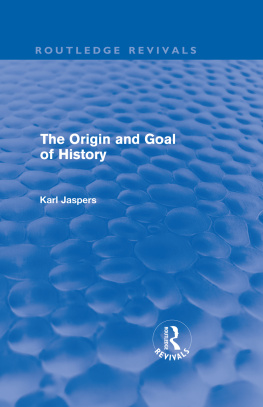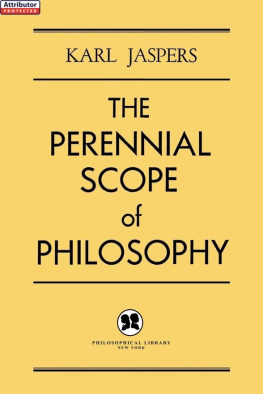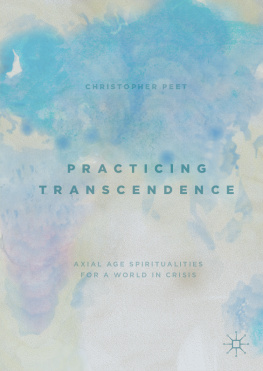
Routledge Revivals
The Origin and Goal of History
First published in English in 1953, this important book from eminent philosopher Karl Jaspers deals with the philosophy of the history of mankind. More specifically, its avowed aim is to assist in heightening our awareness of the present by placing it within the framework of the long obscurity of prehistory and the boundless realm of possibilities which lie within the undecided future.
The Origin and Goal of History
Karl Jaspers
Translated by
Michael Bullock

First published in England in 1953
by Routledge & Kegan Paul Ltd
This edition first published in 2010 by Routledge
2 Park Square, Milton Park, Abingdon, Oxon, OX14 4RN
Simultaneously published in the USA and Canada
by Routledge
270 Madison Avenue, New York, NY 10016
Routledge is an imprint of the Taylor & Francis Group, an informa business
All rights reserved. No part of this book may be reprinted or reproduced or utilised in any form or by any electronic, mechanical, or other means, now known or hereafter invented, including photocopying and recording, or in any information storage or retrieval system, without permission in writing from the publishers.
Publishers Note
The publisher has gone to great lengths to ensure the quality of this reprint but points out that some imperfections in the original copies may be apparent.
Disclaimer
The publisher has made every effort to trace copyright holders and welcomes correspondence from those they have been unable to contact.
ISBN 13: 978-0-415-57868-4 (hbk)
ISBN 10: 0-415-57868-X (hbk)
The Origin and Goal of History
THE ORIGIN AND GOAL OF HISTORY
by
KARL JASPERS

First published in England 1953
by Routledge & Kegan Paul Ltd
Broadway House, 68-74 Carter Lane
London
Printed in Great Britain
by Western Printing Services Ltd.
Bristol
VOM URSPRUNG UND ZIEL DER GESCHICHTE
First German edition 1949
Translated from the German by Michael Bullock
M ANS history has largely disappeared from memory. Only through investigation and research does it become accessibleand then only to a small extent.
The long obscurity of prehistory, the foundation of all that follows, is scarcely broken by such dim light as we can cast upon it. The remains of the historical period properthe period of which we possess written evidenceare fortuitous and full of gaps; history is richly documented only since the sixteenth century A.D. The future is undecided, a boundless realm of possibilities.
Between a prehistory hundreds of times as long and an immeasurable future lie the five thousand years of history visible to us, a minute fraction of the unpredictable duration of mans life on earth. This history is open towards prehistory as well as towards the future. It cannot be limited in either direction, cannot be conceived of as a rounded form, a self-contained and completed structure.
We and the present in which we live are situated in the midst of history. This present of ours becomes null and void if it loses itself within the narrow horizon of the day and degenerates into a mere present. The aim of this book is to assist in heightening our awareness of the present.
The present reaches fulfilment through the historical ground which we bring to effective activity within ourselves. The first part of this book deals with world history up to the present.
On the other hand, the present reaches fulfilment through the future latent within it, whose tendencies we make into our own, either by rejecting or accepting them. The second part of this book is devoted to the present and the future.
A present that has attained fulfilment allows us to cast anchor in the eternal origin. Guided by history to pass beyond all history into the Comprehensivethat is the ultimate goal which, though thought can never reach it, it can nevertheless approach. In the third part of this book the meaning of history is discussed.
KARL JASPERS
Contents
Countries and peoplesPolitical libertyConsistent rationalismInwardness of personal selfhoodImpossibility of circumventing the worldUndogmatism and the exceptionClaim to exclusive truthDecisivenessPersonalities |
Sociological preconditionsThe will to powerThe Biblical religion |
Universal processThe standard of judgment |
Introduction concerning prognoses:Survey of the meaning of prognosticationDocuments of pessimistic prognoses during the nineteenth centuryThe idea of progressBiological prognosesConcern for the abyss of the new realitiesAnxiety as opportunityConcerning the prognostic approach |
*
WORLD HISTORY
The Structure of World History
B Y virtue of the extent and depth to which it has transformed human life, our age is of the most incisive significance. It requires the whole history of mankind to furnish us with standards by which to measure the meaning of what is happening at the present time.
A glance at the history of mankind leads us, however, into the mystery of our humanity. The fact that we possess a history at all, that history has made us what we are and that the duration of this history up to now has been comparatively short prompts us to ask: Where does it come from? Where does it lead? What does it mean?
Since the earliest times man has attempted to picture the whole to himself: first in mythical images (in theogonies and cosmogonies, in which man had his appointed place), then in the image of divine activity operating through the decisive events of world politics (the historical vision of the prophets), then as a process of revelation running through the whole course of history, from the creation of the world and the fall of man to the end of the world and the last judgement (St. Augustine).
The historical consciousness is fundamentally altered when it bases itself on empirical foundations and on these alone. The accounts of a natural genesis of civilisation, such as were devised everywhere, from China to the West, though still in fact legendary, were already empirical in intent. Today the real horizon has become immensely wider. Temporal limitationssuch, for example, as the Biblical belief in a world 6,000 years oldhave been broken through. Something endless opens up into the past and into the future. Within it research adheres to historical remains, documents and monuments of the past.
Confronted by limitless multiplicity, this empirical conception of history must either restrict itself to the demonstration of single regularities and never ending descriptions of the manifold: the same happenings repeat themselves; the analogous recurs within the diverse; there are orders of power-politics in typical series of forms, and there are chaos and confusion; there are regular sequences of styles in the realm of the spirit, and there is levelling-down into that which endures without any regular pattern.
Or the endeavour is made to achieve a unified and integrating overall view of the history of mankind: the factual cycles of civilisation are seen in their development and declinefirst in isolation and then in mutual interaction; the common element underlying the problems of meaning and mutual comprehensibility is apprehended and leads finally to the concept of a single meaningful pattern, in which all diversities have their appointed place (Hegel).
Next page








